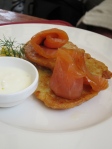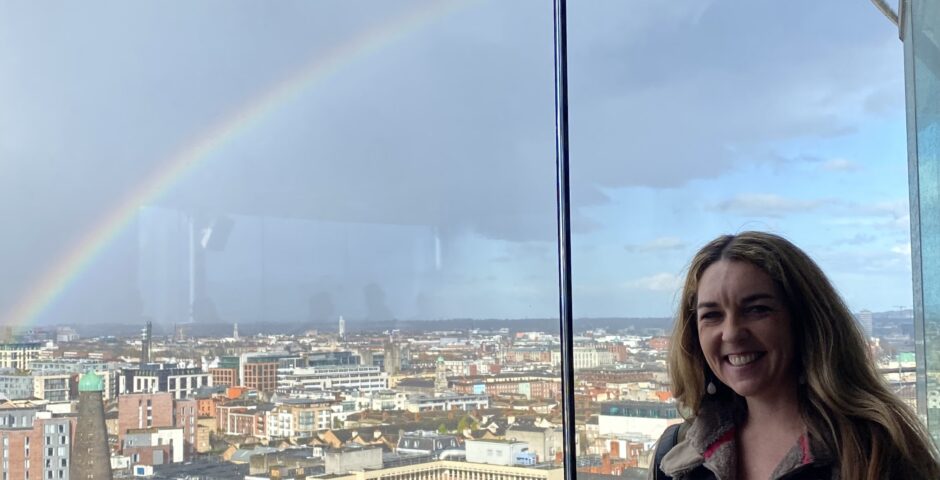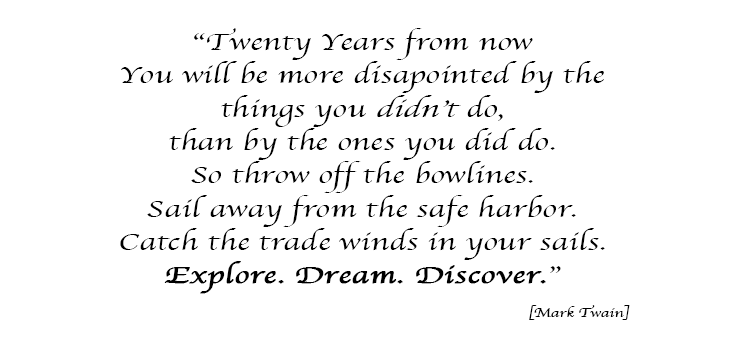Gdansk, Poland
Gdansk is known as the birthplace of Solidarity, the pivotal democratic movement that helped shape changes throughout Easter Europe. It is also the homeland of Lech Walesa, the Nobel Peace Prize winner and former President of Poland, who came aboard later in the day and gave a lively speech.
We entered the mouth of the Vistula River before breakfast and were soon alongside in the area known as Nowy Port (New Port). Busses were needed to transfer us to the historic centre of city, an interesting short ride that took us past the  Solidarity monument, currently under restoration, but still a moving reminder of the tumultuous days of the early 1980s when Lech Walesa, then a shipyard electrician, led the dockyard strike that opened up the first cracks in the edifice of the post World War II Soviet bloc.
Solidarity monument, currently under restoration, but still a moving reminder of the tumultuous days of the early 1980s when Lech Walesa, then a shipyard electrician, led the dockyard strike that opened up the first cracks in the edifice of the post World War II Soviet bloc.
The twentieth century was not kind to Poland in general or to Gdansk in particular. On this very day in 1939, the opening shots of the Second World War were fired from the Vistula at a local fortification by the German gunship Schleswig-Holstein, supposedly on a friendly visit to the port. The Westerplatte Memorial today marks the spot. By the end of the war between five and six million Poles were dead, including the 20,000 Polish officers massacred by the Soviets, apparently an effort to eliminate Poland’s cadre of leadership. Our morning city tour concentrated on the small downtown area that was lovingly restored from old photographs following total destruction during the war. The quality of the rebuilding is all the more remarkable given the parlous nature of the economy in post-war Poland and speaks volumes for the Pole’ famous love of country.

 Having already visited Lübeck, we quickly observed the pattern of a mediaeval Hanseatic city, its enormous brick-built cathedral, a worthy successor to Lübeck’s Mareinkirche. Particularly noteworthy were the town walls and gates facing the river, one equipped with an enormous mediaeval crane used to erect the masts on the Hanseatic cogs. We were soon aware also of that famous commodity of the Baltic’s southern shore, amber. A trans-European trade in amber has been conducted since prehistoric times: Baltic amber is found across the length and breadth of Europe, the earliest example of such a trade in what appears to us to be a luxury commodity as opposed to one of life’s essentials.
Having already visited Lübeck, we quickly observed the pattern of a mediaeval Hanseatic city, its enormous brick-built cathedral, a worthy successor to Lübeck’s Mareinkirche. Particularly noteworthy were the town walls and gates facing the river, one equipped with an enormous mediaeval crane used to erect the masts on the Hanseatic cogs. We were soon aware also of that famous commodity of the Baltic’s southern shore, amber. A trans-European trade in amber has been conducted since prehistoric times: Baltic amber is found across the length and breadth of Europe, the earliest example of such a trade in what appears to us to be a luxury commodity as opposed to one of life’s essentials.
Afternoon options included visits to the excellent Maritime and Archaeological Museums but for many the highlight was the Zodiac cruise through the enormous shipyards, the scene of the Solidarity events. To round off the afternoon, what could have been more fitting than to have former President Lech Walesa visit the ship to address us and answer questions. He was given a hero’s welcome.
I really enjoyed Poland and thought the town was beautiful. I have a lot of Polish in me, so it was nice to see a part of the Country my family is from. I loved how locals and kids were buying ice cream before 10am, definitely my kind of town. Haha. The main area is filled with many amber and tourist shops though. Though, the architecture and beauty makes up for the tourist attractions. We had a nice lunch at a local cafe and enjoyed some Polish soup, yummy potato pancakes with salmon, Gdansk’s famous dumplings, and my Dad tried out the Polish schnitel. I really enjoyed going through the waterways in Gdansk and seeing the harbor, massive ships, huge cranes, and learning about the waterways. It was nothing I’ve ever seen! Incredible, we even watched a crane pick up the upper section of a boat and just take it off and transport it to another! Boating to a new level…makes you appreciate the simplicity of San Diego Bay. Of course another highlight was listening to Lexh Walesa, Nobel Peace Prize winner and former President of Poland, talk aboard the shit that evening.






